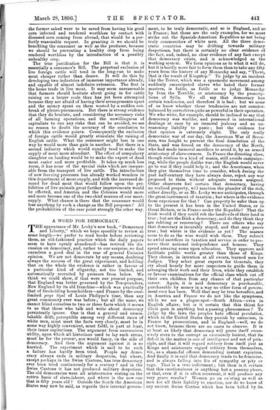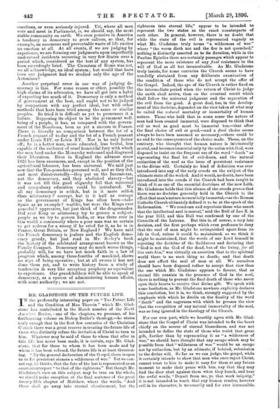A WORD FOR DEMOCRACY. T HE appearance of Mr. Lecky's new
book, "Democracy and Liberty," which we hope speedily to review at some length—we prefer to read books before reviewing them, an old-fashioned practice which the daily papers seem to have openly abandoned—has revived the dis- cussion on democracy, and, rather to our surprise, we find ourselves a good deal in the rear of general Unionist opinion. We are not. democrats by any means, doubting always the success of the great experiment, and holding that on the whole the evidence is rather in favour of a particular kind of oligarchy, not too limited, and automatically recruited by pressure from below. We think we could show, if that were our present purpose, that England was better governed by the Ten-pounders, New England by its old franchise—which was practically that of freeholding householders—and France by the over- limited pays legal of Louis Philippe's time, than any great community ever was before ; but all the same, we cannot blind ourselves to two or three facts which it seems to us that those who talk and write about democracy persistently ignore. One is that a general and unmis- takable drift, perceptible among very different races of white men, must meet the facts very closely, must be in some way highly convenient, must fulfil, in part at least, their inner aspirations. The argument from unconscious utility, upon which all historians used to lay such stress, must be for the present-, one would fancy, on the side of democracy. And then the argument against it is so hurried. The experiment which is said to be such a failure has hardly been tried. People say demo- cracy always ends in military despotism, but where, except perhaps in the Swiss Cantons, has true democracy ever been tried continuously for a century ? and in the Swiss Cantons it has not produced military despotism. The old democracies were all aristocracies resting on the rotten basis of slave-labour, aud where is the new one that is fifty years old ? Outside the South the American States may now be said, as regards their internal govern- ment, to be truly democratic, and so is England, and so is France; but those are the only examples, for we must strike out the Spanish-American Republics as not being truly communities of white men, All the three demo- cratic countries may be drifting towardsmilitary despotisms, but there is certainly no clear evidence of the fact, and, indeed, no clear evidence of any fact except that democracy exists, and is acknowledged as the- working system. We form opinions as to what it will do,. but it is hardly more fair to form them than to take any fifty years from the history of any Monarchy and say, "There, that is the result of Kingship." To judge by an incident like the Terror, which was a spasmodic movement among suddenly emancipated slaves who hated their former masters, is futile, as futile as to judge Monarchy. by Ivan the Terrible, or aristocracy by the proscrip- tions of Sylla. We all say that democracy has certain tendencies, and therefore it is bad ; but we none of us know whether these tendencies are not counter- balanced by correctives quite as powerful in their operation. We who write, for example, should be inclined to say that democracy was warlike, and possessed in international dealings at once by an immoral jealousy and an un- reasoning liability to panic ; but the evidence for that opinion is extremely slight. The only really democratic war of our day, the American War of Seces- sion, was fought to prevent the final dissolution of the State, and was forced on the democracy of the North, who had made immoral sacrifices to avoid it, by an armed aristocracy of slave-owners. In France the directing class, though restless to a kind of mania, still avoids campaign- ing, while the people dislike war; the English would never go to war if they could help it ; and the Americans, when they give themselves time to consider, which during the past half-century they have always done, reject any war proposed to them without adequate reason assigned. Other observers feel certain that democracy, having no realised property, will sanction the plunder of the rich, either directly, or as Mr. Lecky we see anticipates, through the great instrument of taxation ; but where is the evidence from experience for that ? Can property be safer than up to the present it has been in the United States, or in Great Britain, or in Francs under the Republic? That the Irish would if they could rob the landlords of their land is true ; but are the Irish a democracy, and do they think they are robbing or recovering ? There are others who say that democracy is incurably stupid, and that may prove true ; but where is the evidence as yet ? The masses seem to do as the wise would wish them. They submit to awful sacrifices in taxation and service in order to pre- serve their national independence and honour. They spend amazing sums upon education. They approve and facilitate public works greater than those of Kings. They choose, in intention at all events, learned men for Judges. They select great experts for Generals, they cry aloud hourly for more inspectors to guide them in arranging their work and their lives, while they establish or favour examinations for the official class which cut off their own children from any chance of that particular career. Again, it is said democracy is purchasable,. purchasable by money in a way no other form of govern- ment ever has been. Well that may be true hereafter, and in America and France we do not like the symptoms, whde we see a plague-spot—South Africa—even in English affairs ; but is it certain that this thirst foe illicit gain is anything but a passing phenomenon ? To judge by the laws the peoples hate official peculation, which in the United States they punish by ostracism, in France by prosecutions, and in England—well, we do not know, because there are no cases to observe. It is at least as likely that democracy will prove itself exces- sively stern to the corrupt as excessively lenient, that its- deftct in the matter is one of intelligence and not of prin- ciple, and that it will regard robbery from itself just ant Kings and aristocrats regard robbery from themselves, viz., as a shameful offence demanding instant expiation. And finally it is said that democracy tends to be feminine, and is always falling into fits of sympathy or pity or rage. That is a true indictment ; but then is it certain that this emotionalness is anything but a passing phase, or that, even if it is often recurrent, it will produce any very grave results ? Women go on ex:sting as well as men for all their liability to emotion, nor do we know of any ancient Swiss Canton which has been killed by its. emotions, or even seriously injured. Uri where all men -vote and meet in Parliament, is, we should say, the most stable community on earth. We even perceive in America a tendency in democracy to grow callous, so that, for .example, an enormous and preventable waste of life excites -no emotion at all. At all events, if we are judging by -experience we are forming our judgments upon imperfectly understood incidents occurring in very few States over a period which, considered as the test of any system, has been exceedingly brief. The Cresarism of Rome was not, we all acknowledge, an ideal system ; but would that have been our judgment had we studied only the age of the Antonines ?
Another perpetual error in our way of judging de- mocracy is this. For some reason or other, possibly the high claims of its advocates, we have all got into a habit of expecting too much of it. Democracy is only a method of government at the best, and ought not to be judged by comparison with any perfect ideal, but with other methods that have been tried among the same or similar peoples. So tried it is difficult as yet to pronounce it a failure. Supposing its object to be the permanent well- being of a people, it has as compared with the govern- ment of the Bourbons, been as yet a success in France. There is literally no comparison between the lot of a French peasant of to-day and the lot of a French peasant under Louis XIV. or Louis XV. Nor is he only better off; he is a better man, more educated, less brutal, less 'capable of the outburst of cruel homicidal fury with which the men bred under the Monarchy welcomed and disgraced their liberation. Even in England the advance since 1825 has been enormous, and, except in the position of the agricultural labourer, has been universal. We said just now that the Ten-pounders governed well, and so they did, and most disinterestedly—they put on the Income-tax, not the democracy, and they abolished slavery—but it was not till this good oligarchy fell that universal and compulsory education could be introduced. We all say democracy is selfish, but is it more selfish than aristocracy ? corrupt. but is it half as corrupt as the government of Kings has often been—take Spain as an example ? warlike, but were the Kings ever peaceful ? oppressive, but just think of the dragonnades. Did ever King or aristocracy try to govern a subject- people as we try to govern India, or was there ever in this world a community where a poor man was so certain to get redress for a wrong if he cried for it, as he is in France, Great Britain, or New England ? We have said the French democracy j is jealous and the English demo- cracy greedy, but just read in Mr. Seeley's book the history of the celebrated arrangement known as the Family Compact. Democracy may do much worse things, probably will, for we have not much faith in a law of progress which, among three-fourths of mankind, shows no sign of being operative ; but at all events it has not done them yet, and to write history from a study of tendencies is very like accepting prophecy as equivalent to experience. Our grandchildren will be able to speak of democracy, as a system of administering human affairs, with some authority ; we are not.







































 Previous page
Previous page